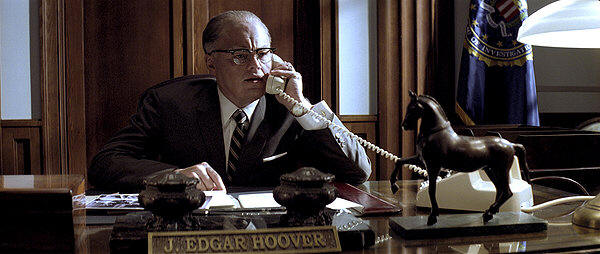J. Edgar
Film Reviewed by Kam Williams
Biopic Uncovers Skeletons in Closet of Legendary FBI Director
 J. Edgar [2011]
J. Edgar [2011]
Rated R for brief profanity.
Running time: 137 minutes
Distributor: Warner Brothers
Film Review by Kam Williams
Very Good (3 stars)
J. Edgar Hoover (Leonardo DiCaprio) served as director of the FBI from its founding in 1935 until his death in 1972. Over the course of that tenure, the legendary G-Man singlehandedly built the agency into an intimidating espionage and crime-fighting operation feared by gangsters and law-abiding citizens alike.
For, as his powers and spheres of influence expanded, he began directing his agents to spy not only on crooks and racketeers but on anyone he considered un-American, such as members of civil rights and anti-war organizations. And armed with the fruit of a variety of arguably unconstitutional surveillance techniques, he proceeded to stockpile a mammoth database of personal dirt to employ for purposes of blackmail, embarrassment and the leveling of veiled threats.
But while he had no problem exposing skeletons in other people’s closets, Hoover apparently went to great lengths to hide his own clandestine relationship with his constant companion of over 40 years, his Deputy Director, Clyde Tolson (Armie Hammer). Successfully suppressing the occasional rumors that they might be lovers, the couple was only outed posthumously by New York City socialite Susan Rosenstiel.
Directed by Clint Eastwood, J. Edgar is a deliberately-paced biopic which gradually finds support for the basic contention that Hoover was, indeed, a sexually-repressed drag queen. The picture blames his latent tendencies on an overbearing mother (Dame Judi Dench) who’d cruelly discouraged him as a youngster from exploring his curiosity about cross-dressing by issuing dire warnings like, "I’d rather have a dead son than a daffodil for a son."
This overambitious flashback flick unfolds against the backdrop of some of the FBI’s most-celebrated cases, from the kidnapping of the Lindbergh baby to the bloody showdown with mobster John Dillinger to the monitoring of the movements of Dr. Martin Luther King, Jr. However, of far more consequence here than any of these touchstones in Hoover’s career is the shadowy specter of him and his life mate secretly sharing stolen moments, whether holding hands in the back of a limo, whispering sweet nothings in each other’s ears, or enjoying makeup sex after a heated argument.

Appropriately narrated in an almost confessional tone by the title character, J. Edgar stands in sharp contrast to the dozens of previous screen portrayals of Hoover which had studiously avoided the sexual preference question. Credit iconoclastic Clint Eastwood for belatedly bringing a more balanced treatment to the screen, even if the shocking truth about such a tortured soul is apt to make audiences squirm in their seats.
Between the cross-dressing and pleas of "Please don’t leave me, Clyde!" brace yourself to see the vulnerable underbelly, literally and figuratively, of an anguished icon knocked off his pedestal.

Read More AALBC.com Film Reviews
